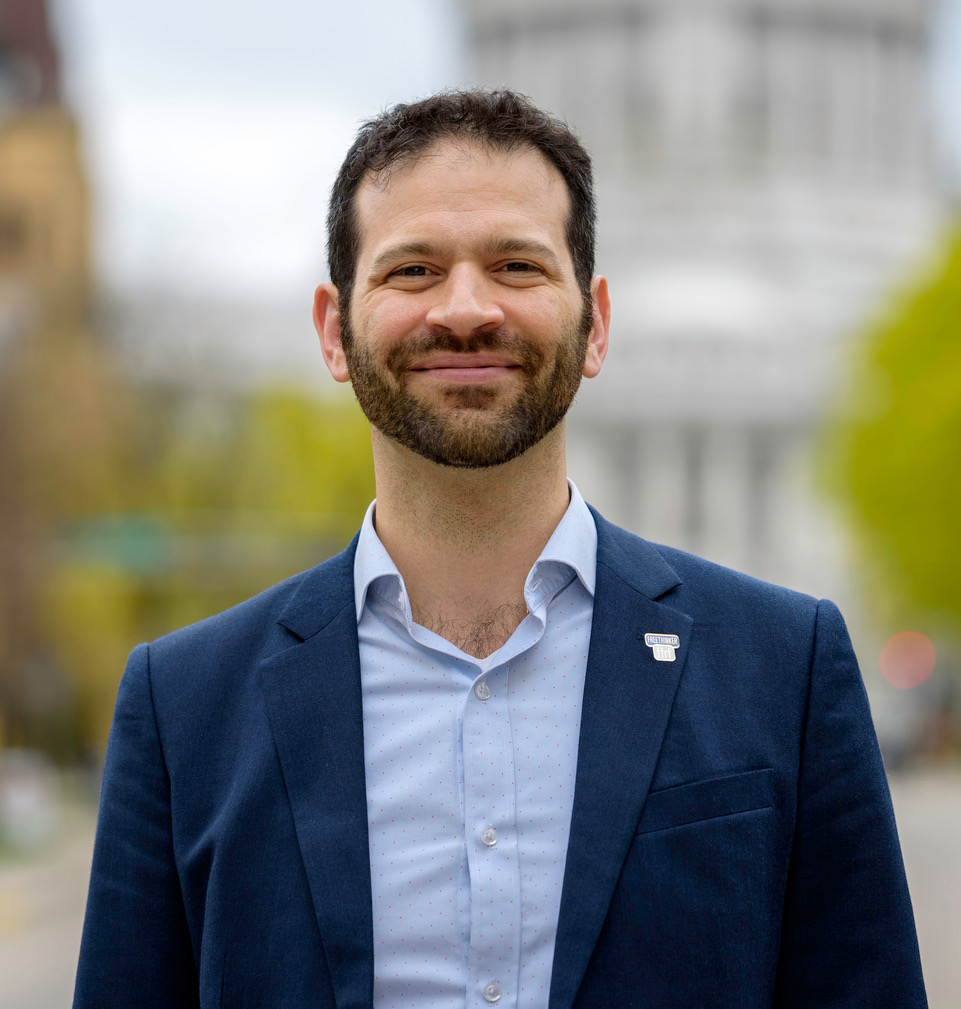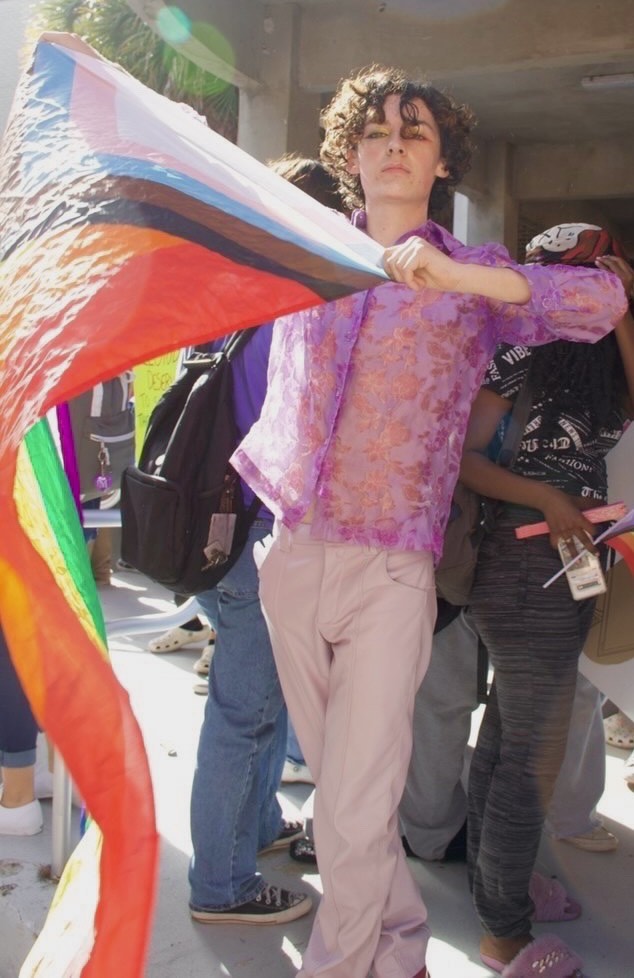Mobile Menu

Lauryn Seering
FFRF’s Mark on the Hill: Scoring victories in Congress

Earlier this year, I spoke about how our strategic goal is to go on the offensive and we are doing that. I am pleased to report that this has been our most productive quarter — and we’re continuing to put points on the board.
In this dispatch of Mark on the Hill, we’ll talk about how we are advancing the Thomas Paine memorial and judicial reform, how we’ve introduced legislation to rein in health care sharing ministries, have had solid wins in Appropriations, have worked with the Congressional Freethought Caucus to call out abuse in the tax code from religious actors, and how the Jan. 6 committee highlighted the impact of white Christian nationalism on the attack.
As we talk about outcomes, I really want to share with you how these successes happened, and how they fit into our overall strategic vision. These successes did not happen by themselves or overnight. They happened because we’ve got a smart and sophisticated team, and because we’ve built solid, long-term and enduring partnerships with religious and nonreligious allies and key offices on the Hill.
Thomas Paine memorial
The Thomas Paine memorial is moving in Congress. The bill is now bipartisan. We cleared a major procedural hurdle with the National Capital Memorial Advisory Commission and got the blessing of the Department of the Interior and related federal agencies. There is a good chance that the bill will pass out of committee in the near future.
This success was not accidental. We began to work closely with the office of Rep. Jamie Raskin, D-Md., to introduce a piece of legislation to construct a memorial to Thomas Paine in Washington, D.C., before Covid struck. He introduced the legislation in February. Once the bill was introduced, a team of us from FFRF, the Thomas Paine Memorial Association, Center For Inquiry and the Secular Coalition for America kept engaging the Hill to obtain co-sponsors and build support for the memorial.
At the same time, we started to prepare for the advisory commission’s presentation. The commission’s support is critical because it signals to Congress that the project is feasible and it concurs with current law. We obtained its support with a clear strategy to highlight popular support for the project and showcase congressional involvement. At the meeting, Raskin gave the commission a master class on the historical importance of Thomas Paine and his office led a congressional sign-on letter with 11 members that demonstrated bipartisan support.
After that, we had speakers talk about the importance of Thomas Paine from the perspectives of freethinkers, veterans, conservatives, African Americans and the youth. The commission voted unanimously to support the bill, paving the way for future success in Congress.
Health care sharing ministries
Health care sharing ministries are a form of health coverage in which members — who are required to share a system of religious or ethical beliefs — make monthly payments to cover health expenses of other members. They do not have to comply with the consumer protections of the Affordable Care Act, do not guarantee payment for medical claims, provide limited benefits for their members, and are largely unregulated and shielded by religious exemptions. About 1.7 million Americans subscribe to health care sharing ministries, and it is an industry that is valued in the hundreds of millions of dollars. (You may have seen a special on John Oliver’s show about them.)
In July, Congressional Freethought Caucus Co-Chair Rep. Jared Huffman, D-Calif., introduced the Health Share Transparency Act to rein in health care sharing ministries. This bill is one of my favorites because it is a solid piece of legislation that puts the religious right on the defensive. The bill shows that the Congressional Freethought Caucus is going to be asserting itself.
The Health Share Transparency Act’s introduction was not automatic. We’ve been working on health care sharing ministries for over a year. After John Oliver’s show, interest started to grow in Congress to learn more about these organizations, how they work, and what can be done to rein them in. Andrew Torrez, a leading expert, presented to members of the Congressional Freethought Caucus. Huffman appeared on Freethought Matters to talk about these entities. And the Congressional Freethought Caucus sent a letter to the Federal Trade Commission asking it to protect consumers from such health care organizations. It became apparent that legislation was needed to curb these outfits — and that’s why Huffman introduced the Health Share Transparency Act.
Our next step is to work with storytellers who can personally speak. If you would like to share your experience with health care sharing ministries — or you know someone who would — our email address is This email address is being protected from spambots. You need JavaScript enabled to view it..
Family Research Council and the IRS
Rep. Huffman continues to go on the offensive. After a ProPublica report revealed how right-wing Christian organizations like the Family Research Council have been able to change their tax status to an “Association of Churches” to avoid public accountability and scrutiny, Reps. Huffman and Suzan DelBene, D-Wa., developed a congressional sign-on letter to Treasury Secretary Janet Yellen and the IRS commissioner. Over three dozen members of Congress signed onto the letter, and we’re awaiting the Treasury’s response.
This letter may also give us an opportunity to discuss with members of Congress the need for 990 reform, where all nonprofit organizations, secular and religious, must file the same information with the IRS.
Judicial reform
We have been horrified with the recent Supreme Court decisions that erode the separation of state and church and key freedoms. FFRF knew that the federal courts would become more hostile toward keeping religion and government separate. We made a clear decision to start investing in governmental affairs to preserve our critical freedoms. One of our key projects is to reform our courts. We became a member of the Leadership Conference for Civil and Human Rights (a coalition of like-minded justice organizations) Fair Courts Task Force and have used that membership to actively support and oppose judicial nominees. We slowed down and opposed numerous nominees of previous President Trump, have been working to get more justices who support the separation of state and church, and recently urged the Senate to make sure judicial appointments remain a high priority.
This Congress, we have seen traction on court reform, particularly with the Supreme Court Ethics, Recusal, and Transparency Act, which helps to make sure the conflicts like the one Ginni Thomas poses are no longer legal. This bill, with FFRF’s support, got out of committee and we are helping to get it onto the House floor. We’re also advancing more dynamic court reform legislation. We have been working with critical allies, such as Demand Justice, on checking the power of the Supreme Court by expanding it with the Judiciary Act of 2021. We are diligently working to gain more co-sponsors on both of these pieces of legislation with our allies to gain the support of more members.
Part of our success is because of Rep. Hank Johnson, D-Ga., who is a member of the Congressional Freethought Caucus and is the chair of the Judiciary Subcommittee on the Courts. He is championing all of the judicial reform bills, and he has appeared on Freethought Matters to discuss his work.
Appropriations
We’ve had two significant victories in appropriations this year. The first is that FFRF called for and secured an increased amount of funding for IRS enforcement. The IRS can use these additional funds to help enforce the Johnson Amendment. Although the appropriations process is far from over, we expect that this level of funding will remain, and we will then work with the IRS on the importance of enforcing the Johnson Amendment.
The second appropriations win was to help solidify Ann Druyan’s humanistic vision of space exploration, in conjunction with Cornell University’s Carl Sagan Institute’s efforts to increase funding for early-stage research. In the House Appropriations package, Congress wants NASA and its external partners to “maintain the ability to address long-term strategic goals rather than only focusing on short-term, mission-specific objectives.” A key part of fulfilling Ann’s vision is for NASA to think more broadly about where, how, and with what values it wants to explore space over the next 100 years.
Jan. 6th and white Christian nationalism
The Jan. 6 committee is extremely intentional about how it is presenting information to the American public. It was not an accident that it showed a clip of Roger Stone encouraging protesters the night before the Jan. 6 attack, thus linking the assault on the Capitol to white Christian nationalism.
Building into the committee’s work, we produced a report, with our friends from the Baptist Joint Committee and leading authors, that demonstrated how white Christian nationalism was a leading influence on the attack. Rep. Huffman, after reading the report, spoke about it on the House floor.
Conclusion
Our legislative portfolio is extremely well balanced. We have items that are very bipartisan, such as the Thomas Paine memorial. We are advancing legislation, such as the Supreme Court Ethics, Recusal, and Transparency Act, that is likely to pass the House and echoes the sentiments of the majority of members. And we are advancing legislation that is more forward thinking, such as the Health Share Transparency Act and the Judiciary Act of 2021. All of this is adding up to significant wins in Congress.
Despite the numerous setbacks in the courts, we will continue to advance in governmental affairs and go on the offensive. I'm extremely proud of all the work we have done. In the fall, we will start to gather our allies and continue our work to decrease congressional support for the National Prayer Breakfast. I'm hoping for more significant legislative wins in the near future.
Thank you so much for your support and advocacy efforts. Clearly, it is paying off.
All the best,
Mark Dann
Director of Governmental Affairs
Freedom From Religion Foundation, Inc.
Matt Langer
MATT LANGER received a B.A. in philosophy from the University of Wisconsin-Madison in 2012. After graduating, he started working primarily in behavioral health as a counselor, case manager, and intake specialist. Matt joined FFRF as an intake legal assistant in July of 2022. In his spare time, he dabbles in graphic design and attempts to play guitar.
Freethought Radio -- August 11, 2022
New apostolic reformation faces profound rift due to Trump prophecies and 'spititual manipulation of the prophetic gift'
Strong Backbone Student Activist Award: Shaye Beardsley

FFRF announces S.D. student as ‘strong backbone’ activist awardee
The Freedom From Religion Foundation is pleased to bestow a South Dakota high school student with its $1,000 student activist award for her objections to her school board starting its meetings with Christian prayer.
Shaye Beardsley, a senior at Stevens High School, has been granted the “Strong Backbone Student Activist Award” after she spoke up at the April 5 meeting of the Rapid City Area Schools board against its recent practice of inviting clergy to pray at meetings.
The Freedom From Religion Foundation received a complaint about the school board opening with an invocation in October of last year and sent a letter. After no reply, FFRF Legal Fellow Karen Heineman followed up with an open records request in January. She again received no response. In the meantime, a few adults in the community had voiced displeasure about the prayers in comments during the meeting.
At the April meeting, Beardsley spoke up on behalf of herself, as well as several other students, including a Christian student who said it was not only unconstitutional but unkind to force the religion on those who don’t practice Christianity. Beardsley’s testimony included a recitation of the Supreme Court decision against official school prayer. With a flourish, she ended her short testimony by adding, “Almost all of these people can vote in the next election.”
She explained the reasons for her intervention to FFRF.
“The issue that I addressed in that specific meeting was about the invocation that is recited at the beginning of every meeting,” she said. “Every time the prayer is said, it is always a Christian prayer invoked by a Christian minister. Not only does this prayer alienate students who don’t believe in Christianity, it also creates an environment that makes some people feel unsafe and/or unwelcome. This results in less communication between viewpoints as a specific group is being alienated from the place that it is supposed to go to feel seen and heard.”
Demonstrating the problem, Pastor James Moore from Journey Church was formally introduced at the board meeting on April 5 and intoned, “Lord, all authority is given by you and you’ve placed anyone in authority in their position … to make godly decisions for our children in Jesus’ name. Amen.”
Beardsley’s interests include activism, reading, music and playing softball.
“I plan to take a gap year on the West Coast and get in-state tuition for college,” she tells FFRF. “My major is still undecided but will most likely be something along the lines of journalism or international relations.”
FFRF is impressed with the spirit of student outspokenness that Beardsley represents — and will persist in its work to ensure that such activism is supported.
“FFRF will continue to educate the school board on the inappropriateness of mixing prayer and public school business, especially given the fact that students are present,” remarks Heineman.
FFRF Co-President Annie Laurie Gaylor says, “We’re proud of Shaye. She’s the one teaching the school board what they should already know. It’s the height of ego to invite clergy who assert these particular school board members were placed on the school board by God to make ‘godly decisions’ for children ‘in Jesus’s name’! No, they were placed there by taxpayers to run an entirely secular school district, whose purpose is to educate, not indoctrinate.”
The $1,000 annual scholarship is financed by an octogenarian FFRF member who gives the scholarship on his birthday to encourage and reward activism by freethinking students.
Catherine Fahringer Student Activist Award: Will Larkins

Fla. teen activist against ‘Don’t Say Gay bill’ gets $5,000 FFRF award
The Freedom From Religion Foundation is proud to be naming Florida teenager Will Larkins as recipient of its Catherine Fahringer Student Activist Award, which includes a $5,000 cash scholarship.
Larkins, a junior at Winter Park High School, Fla., is president and co-founder of the school’s Queer Student Union and one of the organizers of an impressive Say Gay Anyway walkout of 500 students on March 7. Larkins even testified in person on Feb. 28 before the Florida Legislature against the punitive measure, which passed on March 8, but which hasn’t yet been signed into law by Gov. Ron DeSantis.
The Parental Rights in Education bill is also known as the “Don’t Say Gay” bill because it seeks to inhibit or outright prohibit public schools from teaching about sexual orientation and gender identify. From kindergarten to third grade, such mentions would be illegal, and would only be permitted through the 12th grade if not deemed “age-inappropriate” by any complaining parent. Additionally, the bill would encourage parents to sue districts for alleged violations, and teachers to effectively “out” students to parents.
In a moving guest essay, “Florida’s ‘Don’t say gay’ bill will hurt teens like me,” that ran in the New York Times in March, Larkins recounts being surrounded by classmates at a high school Halloween party last year, who shouted homophobic slurs, with one student threatening violence.
“When I broke down crying in class the next day, my teacher comforted me,” Larkins writes. “She told me that she had gone through something similar when she was my age . . . Had the proposed law been in effect last year, my teacher could have put herself in jeopardy by being there for me.”
Larkins adds: “From an early age I knew I was different. . . . By fourth grade, I was convinced that I was broken. I didn’t know how to defend myself when other kids made hateful comments or bullied me — I didn’t know why I was the way that I was.”
In learning “how common the experience of falling outside the gender binary was . . . I grew to understand and love myself,” Larkins writes. “Education made me hate myself less.”
Larkins cites statistics from the the Trevor Project, which show that LGBTQ teenagers — who are four times more likely to attempt suicide as straight counterparts — are far less likely to attempt suicide if they learn about LGBTQ issues in school.
“People in support of the bill always ask, ‘Why do these subjects need to be taught in schools?’ To them I would say that if we understand ourselves, and those around us understand us, so many lives will be saved,” Larkins concludes.
“We are so impressed with Will Larkins’ courage and activism, for so bravely sharing personal experiences and for speaking out at school and in his state Capitol against this pernicious legislation,” comments Annie Laurie Gaylor, FFRF co-president.


